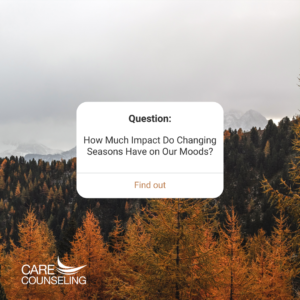How Much Impact Do Changing Seasons Have on Our Moods?
 Picture this: the vibrant hues of autumn leaves, the warm embrace of summer’s sunshine, the crisp air of winter, and the colorful burst of spring blooms. The changing seasons not only transform the world around us but often evoke a range of emotions within us. Many of us have felt the subtle shifts in our moods as the seasons transition. But just how much do changing seasons influence our emotional well-being?
Picture this: the vibrant hues of autumn leaves, the warm embrace of summer’s sunshine, the crisp air of winter, and the colorful burst of spring blooms. The changing seasons not only transform the world around us but often evoke a range of emotions within us. Many of us have felt the subtle shifts in our moods as the seasons transition. But just how much do changing seasons influence our emotional well-being?
Seasons and Emotions: A Complex Dance
The relationship between seasonal changes and our moods is a complex one, influenced by a myriad of factors including biology, psychology, and personal experiences. While it’s not a one-size-fits-all phenomenon, there are significant ways in which the seasons can impact our emotional states.
- Winter Blues and Seasonal Affective Disorder (SAD)
As the days grow shorter and darkness prevails, some individuals may experience what is commonly known as the “winter blues.” This seasonal mood shift often coincides with Seasonal Affective Disorder (SAD), a type of depression that typically occurs in the fall and winter months. SAD can bring about symptoms such as fatigue, sadness, irritability, and a craving for carbohydrates. Reduced exposure to natural sunlight during these seasons is believed to disrupt our circadian rhythms and serotonin production, contributing to these mood changes.
- The Energizing Power of Spring
With the arrival of spring, we often witness a collective sigh of relief. The longer days, blooming flowers, and warmer weather seem to infuse a sense of renewed energy and optimism. Known as “spring fever,” this surge in positive emotions is attributed to increased exposure to sunlight, which can enhance our mood by triggering the release of serotonin and boosting vitamin D levels.
- Summer Bliss and the Sunshine Effect
Summer brings with it a sense of adventure and joy for many. The abundance of daylight, outdoor activities, and vacations can lead to improved mood and a sense of well-being. Sunlight exposure not only stimulates the production of serotonin but also encourages the release of endorphins, often referred to as “feel-good” hormones. These neurochemical changes may explain why people tend to feel happier during the sunny months.
- The Reflective Season of Autumn
Autumn, with its golden landscapes and cooler temperatures, often evokes a sense of reflection and nostalgia. The shift toward shorter days and cooler weather can lead to a more introspective mood for some. As we witness the vibrant transformation of nature, it can serve as a metaphor for the cyclical nature of life, prompting contemplation about personal growth and change.
Personal Variations
It’s important to note that the impact of changing seasons on our moods can vary widely from person to person. Personal experiences, genetic predispositions, and individual coping mechanisms play a significant role in how each of us responds to seasonal shifts. For some, the change of seasons may have a profound and immediate impact, while others may hardly notice any change in their emotional states.
Coping with Seasonal Mood Changes
For those who experience significant mood changes with the seasons, there are various strategies to help cope with these shifts:
- Light Therapy: Light therapy, also known as phototherapy, involves exposure to bright, artificial light to combat the effects of reduced natural light during the darker months.
- Regular Exercise: Engaging in regular physical activity can boost mood and combat feelings of lethargy associated with seasonal shifts.
- Mindfulness and Meditation: Practicing mindfulness and relaxation techniques can help manage stress and maintain emotional balance throughout the year.
- Seeking Support: For those with Seasonal Affective Disorder or severe seasonal mood changes, seeking support from mental health professionals is essential. Therapy and, in some cases, medication can be effective treatments.
The impact of changing seasons on our moods is undeniable, yet the extent varies among individuals. Whether it’s the winter blues, spring’s rejuvenation, the summer’s embrace, or autumn’s reflection, each season offers us a unique emotional landscape to navigate. Understanding this interplay between seasons and emotions allows us to adapt and find ways to embrace the beauty of each season, both outside and within ourselves.



























